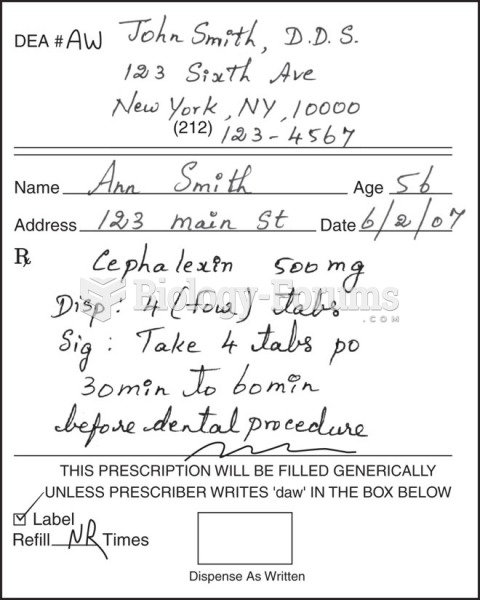Answer to Question 1
Correct Answer: 2,3,4
Rationale 1: Even pets can contract rabies.
Rationale 2: The incubation period for rabies is 60 days, so the animal must be observed for that length of time.
Rationale 3: Rabies immune globulin will offer immediate protection.
Rationale 4: Five doses of rabies vaccine are given over a 28-day period.
Rationale 5: This is not the dosing schedule for rabies vaccine.
Global Rationale: The rabies virus is carried in saliva and is passed to humans through animal bites from infected dogs, coyotes, wolves, foxes, raccoons, skunks, and bats. Following the bite of an infected animal, the incubation period for rabies infection is long, from 20 to 60 days. When possible, the biting animal is confined and examined for rabies infection. Patients receive one dose of rabies immune globulin, which offers immediate protection. Five doses of rabies vaccine are then administered over a 28-day period.
Answer to Question 2
Correct Answer: 2,3
Rationale 1: Even if this is a true statement, the nurse should encourage clients with COPD to take the influenza immunization.
Rationale 2: Once an outbreak of influenza occurs, immunization is no longer effective.
Rationale 3: It is difficult to treat influenza in any population, and those with chronic lung diseases are particularly difficult to treat.
Rationale 4: The influenza vaccine changes year to year based upon the probability of which strains will be most active.
Rationale 5: Most influenza outbreaks take place in the winter, so waiting until January is not advisable.
Global Rationale: Once an outbreak of influenza occurs, immunization is no longer effective and pharmacotherapy of the active infection may be initiated. Because treatment of influenza infection is minimally effective, the best approach for dealing with this infection is through prevention. The nurse should not minimize this patient's need for immunization. The immunization must be administered annually. January is late for an immunization.







